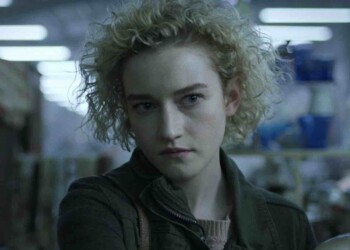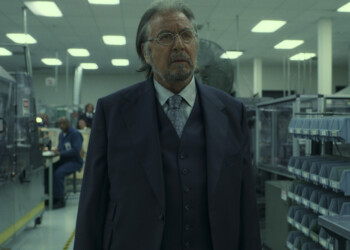“Game of Thrones” came to an end one year ago today but what kind of legacy does the series leave behind after several beloved seasons and a much maligned final few episodes…
By Damon Martin — Editor/Lead Writer
When “Game of Thrones” first premiered on HBO in April 2011, there were high expectations for what the show could become but nobody predicted that it would end up as the most talked about TV show since Tony Soprano wandered into a neighborhood eatery and “The Sopranos” faded to black.
The show continuously added millions upon millions of viewers, built on the back of a creation from author George R.R. Martin that was already a favorite amongst science-fiction and fantasy fans. Those books served as the backbone to the series—at least for a while—but even after “Game of Thrones” blew past the original material, viewers flocked to the show to find out what happened next.
On May 19, 2019, “Game of Thrones” came to an end with a final episode titled “The Iron Throne.” Even before that aired, “Game of Thrones” had faced more criticism for the final season than any that came before it because showrunners David Benioff and Dan Weiss crammed a lot of material into just six episodes. With a lot of dangling threads that needed tied up, it felt like the “Game of Thrones” showrunners were racing towards the finish line rather than taking the necessary time needed to finish this marathon race that the show became.
Now we take a look back at that final episode and the legacy that “Game of Thrones” has left behind one year later.
The Lead Up to the Final Episode

It’s hard to even gauge the kind of fierce anticipation that built up to the final season of “Game of Thrones” after fans waited nearly two years for the last six episodes to land on HBO.
An ambitious production schedule along with a mountain of effects work that had to be done forced the team behind “Game of Thrones” to meticulously plan the last season before finally debuting in April 2019. Expectations were incredibly high but many of the actors on the show began speaking about the final season with less than enthusiastic responses when asked about what lies ahead.
Maybe some of them were playing coy but when Kit Harington was asked to describe the final episode in one word he led with “disappointing.” He then followed that up by saying it was “epic” and perhaps he was joking but considering the reactions to the final season, it’s possible Jon Snow was already seeing the future. Emilia Clarke, who played Daenerys Targaryen for all eight seasons, didn’t exactly set the world on fire (pun intended) with her reaction to the final season or the last episode.
During a red carpet premiere, she was asked about the finale and the Mother of Dragons could only giggle alongside cast mates Nathalie Emmanuel and Jacob Anderson before blurting out “best season ever” as if it was part of her contract to say it.
Part of the problem “Game of Thrones” faced from season 6 moving forward was a lack of source material that helped guide the way. Martin had fallen behind on his writing and the next book in his “A Song of Ice and Fire” series was long, long overdue.
That meant “Game of Thrones” had to move beyond the books and it was evident from that moment on that Benioff and Weiss were well equipped for the big, bold explosive episodes that followed but they weren’t nearly as ready for the nuance that Martin had woven into the very fabric of his books.
A quote from Tywin Lannister back in season 3 following “The Red Wedding” kind of explains what happened to “Game of Thrones” after the show moved beyond the books.
“Explain to me why it is more noble to kill ten thousand men in battle than a dozen at dinner. The price was cheap by any measure.”
Obviously, “Game of Thrones” had some truly epic battles in those first few seasons — The Battle of Blackwater Bay is an easy one to identify — but the quieter moments like what led to the betrayal by the Freys against the Starks spoke to the complex storytelling at the heart of the series.
Benioff and Weiss were great at killing ten thousand men in battle when following Martin’s scripts. They weren’t nearly as adept at figuring out what to do with those dozen at dinner after the source material was finished.
As for the five episodes that led into the finale, those also received a mixed bag of reviews.
While “A Knight of the Seven Kingdoms,” which featured Brienne of Tarth being knighted as well as the anticipation building towards an eventual showdown with the Night King and his army of the dead, the very next episode featuring one of the biggest battle scenes in television history landed with a dramatic thud.
“The Long Night,” which was the culmination of eight seasons of mythology that started with the pilot episode didn’t exactly play out the way that most fans hoped. After all the tension that ratcheted up from season to season with the White Walkers being painted as the ultimate threat to the realm, their entire conquest was finished inside of one very dark episode.
Not dark in terms of emotion. Actually dark. Like you couldn’t see half of what was happening during the episode.
The final twist also left a lot to be desired after Arya Stark — absent from the North for almost the entire series — ended up being the person who finally shattered the Night King into a million pieces. It was a cheap bit of fan service because Arya had become one of the most beloved characters on the show but it disingenuous to the series as a whole considering she had never even interacted with the White Walkers prior to returning home and reuniting with her brothers and sisters.
From the end of that eight-season long war, “Game of Thrones” then immediately shifted back to the other story that dominated the final season — Daenerys’ quest to take back the Iron Throne and the looming secret that her lover was also her nephew.
One of the best parts of “Game of Thrones” through the majority of seven seasons was the slow build that the show took before arriving at huge moments or battles. The sense of dread looming over The Red Wedding in the infamous episode “The Rains of Castamere” as well as the gradual advancement made until finally reaching “The Winds of Winter” when Cersei smites all of her enemies and Daenerys’ long journey back to Westeros reaches its conclusion.
Unfortunately none of that happened in the final season of “Game of Thrones” much less the last episode.
Events moved at break neck speed. Travel that previously took several episodes was done in a matter of minutes. It felt like the showrunners were desperate to get finished with the series rather than taking their time to reach a logical conclusion.
So it’s easy to see why there was so much trepidation leading into that final episode with one group of fans convinced “Game of Thrones” would stick the landing and another faction expecting the series to disappoint them much like the rest of the season.
The Final Episode

There was a lot to unpack during that final episode in the aftermath of Daenerys turning into the Mad Queen and just inexplicably burning King’s Landing to the ground as she planned to build a new kingdom on its ashes.
Uneasy with her new approach at playing monarch, Jon Snow took it upon himself to kill Daenerys and then her body was carried away by her last remaining dragon, Drogon, and the Seven Kingdoms were once again thrown into upheaval.
In the end, a council crowned Bran Stark — arguably one of the least liked characters on the series — as the new king, thus ending the bloodlines that ruled Westeros. He created a group of advisors to help him serve the realm including Tyrion Lannister, Ser Bronn of the Blackwater and Grand Maester Samwell Tarley. Sansa Stark was crowned Queen in the North and her home land was declared independent from the rest of the now Six Kingdoms of Westeros.
As for Jon, he was sent back to Castle Black where he was to serve out the rest of his days as a member of the Night’s Watch despite the fact that the Wall no longer existed. He decided to ignore those orders and instead ride into the true North where he would live out the rest of his days as a Wildling.
Almost immediately after the finale aired, complaints began online.
Opinions varied but it was hard to argue against some of the most poignant problems including Cersei Lannister’s lack of a story throughout the final season and then one of the most disappointing death scenes in the show’s history one episode before the finale. The same could be said for her brother/lover Jamie Lannister, who redeemed himself by turning against Cersei and then inexplicably returning to her side for reasons no one can quite explain.
There was also the mythology that dominated so much of the series that really played no part in the final season much less the series finale. Particularly, Jon Snow’s true parentage — a question Benioff and Weiss were required to answer before Martin would give them permission to make the show — was finally revealed yet it really did nothing when it came to the final outcome. Sure, Jon got a little hesitant to jump back into bed with Daenerys after learning that she was his aunt but outside of some internal strife that Harington played at his sullen-best, the massive revelation really played no part whatsoever in the final season.
It was made even worse when Jon killed Dany and then just conceded to abandon his blood right to the Iron Throne in favor of returning to the wild beyond the Wall because those were his true people all along? It was a bizarre ending for such an important character, whose only role in the final season was killing Daenerys.
For all the ways the final season had ups and downs it felt like the last episode was just a series of missteps as the creators behind the series just gave up and reached the conclusion.
In fact, Benioff and Weiss largely avoiding any interviews whatsoever addressing the finale and even cancelled an appearance at San Diego Comic Con in 2019 when they were scheduled to appear as one final goodbye to the series. That says a lot about the reaction they received after the show ended.
The Aftermath

It’s an unfortunate side effect that great television shows can ultimately be judged by how they end rather than the larger parts as a whole. At the same time, any quality story still requires a satisfactory ending or what came before it just doesn’t have the same impact.
“The Shield” might still rank as the single greatest series finale in television history — no spoilers here but ask anybody who knows television and they’ll likely tell you the same.
Meanwhile a series like “Dexter,” which definitely ebbed and flowed with good and bad seasons throughout the run of the show, ended with one of the most ridiculously absurd final episodes ever filmed.
“Game of Thrones” probably falls somewhere closer to “Dexter” than it does “The Shield,” although there are faithful fans of the series that still love how it ended.
There are two ways to look at the “Game of Thrones” finale one year later.
First, the expectations were impossibly high and it seems rather unlikely that there was any way the writers on the show were going to be able to appease the majority of the fan base no matter what happened.
On the other hand, the final season of “Game of Thrones” packed in so much fan service including Arya killing the Night King and Cleganebowl, that it felt like Twitter was essentially handing over ideas to Benioff and Weiss as they continue to add more and more of it into the show. Then when it came to the finale, Benioff and Weiss opted to go in the complete opposite direction to give people the ending they deserved rather than the finale that they wanted.
Like it or not, the “Game of Thrones” finale (and the final season as a whole) absolutely changes the way you feel about the entire series.
If you loved it then “Game of Thrones” will likely remain one of your greatest television series of all time. Sadly for so many fans of the show, the finale tainted almost everything that came before it and there was a sour taste left in the mouths of avid watchers who stuck with the series from beginning to end.
The legacy of “Game of Thrones” could be a show that became a cultural phenomenon unlikely to be duplicated again, especially in the golden age of streaming where it’s tough to get 10 million people to agree to watch anything. Then again, “Game of Thrones” might serve as a cautionary tale of sorts that slow and steady wins the race but for some reason the creators behind the series just couldn’t wait to be done with it.
Maybe they were tired and wanted to move onto something else (although given the premise behind their next idea “Confederate,” it’s probably better they stick to telling other people’s stories) or perhaps they truly felt that 13 episodes over the final two seasons was enough to close out a story that took 60 hours to get there.
Longtime fans of the books are still holding out hope that Martin will give them a more satisfactory conclusion, although the nine year wait on the sixth novel in a series that’s supposed to end with seven total, doesn’t inspire much hope.
For me personally, I haven’t gone back and watched a single second of “Game of Thrones” since that final episode ended a year ago. It’s not that the show doesn’t still hold a special place in my heart but the finale definitely left me feeling differently about the series as a whole. Reality is time does heal most wounds — the second half of the second season of “Twin Peaks” felt like a mess after first watching it but going back now, there’s a new sense of appreciation for that entire series.
Maybe that will happen with “Game of Thrones” as well.
There will be a renewed interest soon enough when HBO rolls out the prequel series “House of the Dragon” that will tell the history behind House Targaryen long before “The Mad King” ruled Westeros. Martin already finished telling that story in a book titled “Fire and Blood,” which means the showrunners behind that series have a guide to follow while hopefully learning from the mistakes of their predecessors.
As for the legacy of the show, “Game of Thrones” remains one of the most watched and talked about television series in history — a single episode won’t change that. Love it or hate it, the series finale has also become the most debated ending since that scene in “The Sopranos” where Tony looks up and then everything just goes black in an instant.
20 years from now we might all look back and realize Bran the Broken was the perfect choice to be king and Daenerys really did deserve to die. Then again, we might just stop after the Battle of Winterfell and pretend the show ended right then and there.






